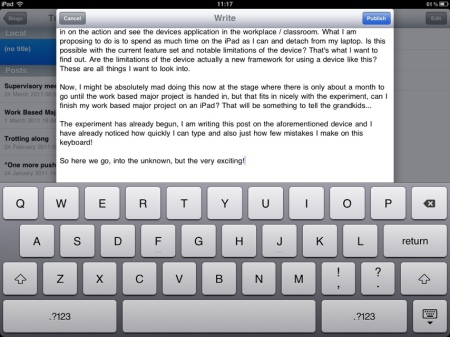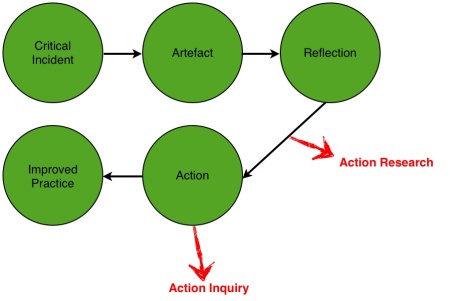
How can I adapt and improve Moodle?
Previously, I had identified current strengths and weaknesses within Moodle. I will now look to develop a new skill to address a current weakness of the platform.
I had observed that the current system was being used to distribute materials and information effectively to students, but little was happening to gather these same things from the students themselves.
I am currently at the point in the academic year where coursework is being completed from both years 10 and 11. Based on experiences over the past two years, the biggest difficulty students have is ensuring that assessment criteria is met for their assignments, and therefore as a department, we developed paper checklists that students could use to tick off every objective as they completed it. The weakness with this system is that over the course of their assignments, checklists were lost entirely or became tatty in appearance and therefore difficult to read as tasks were added, removed and modified by hand.
As we now have a Moodle system in place, I will look at developing a method of checklists being completed on the Moodle platform.
Research in the official Moodle documentation did not reveal a simple way of achieving this with the standard feature-set of Moodle. I then did some broader research on the internet which lead me towards the official Moodle forums where I came across a thread where others were trying to achieve the same thing. At this stage I had gained knowledge of the extensive support network of other Moodle users from around the world. I then added to this forum post where I detailed my needs for the checklist. I was then quickly responded to by other members of the forum with suggestions that unfortunately did not quite meet my needs.
After a few hours, I then received a message from a forum member that suggested a Module for Moodle that would let me achieve my goal.
Planning and implementation
A Module is something that extends the functionality of Moodle beyond that of what it is capable of as standard. There are currently just over 600 modules for Moodle at the time of writing that extend it in a very many variety of ways. The module that I am planning to implement is simply called: ‘Checklist’
From the author’s description:
This is a Moodle plugin for Moodle 1.9 that allows a teacher to create a checklist for their students to work through. The teacher can monitor all the students’ progress, as they tick off each of the items in the list. Items can be indented and marked as optional. Students are presented with a simple chart showing how far they have progressed through the required/optional items and can add their own, private, items to the list.

From the description and screenshot of the Module this appears to fulfil my needs of a Checklist and add the functionality of the Teacher being to able monitor progress, a benefit that I had not previously considered.
The extra information provided by the author of the Module provided information on how to install the plugin into my Moodle platform. This was much simpler that I had anticipated with only three steps to the install:
- Unzip the contents of file you downloaded to a temporary folder.
- Upload the files to the your moodle server, placing them in the ‘moodle/mod/checklist’ folder.
- Log in as administrator and click on ‘Notifications’ in the admin area to update the Moodle database, ready to use this plugin.
I performed the transfer of the Checklist files to Moodle with a free piece of Software called Cyberduck. A simple and effective FTP client I use to transfer files two and from my departments web server.
Once I had followed these steps, there was indeed a new item in my existing Moodle courses called ‘Checklist’.
Before I trialled it with students, I added a sample checklist module instance to a test course I created and created a test student account to see what the student would see and how the teacher can then control it. This proved that the module did provide the functionality I was looking for. I then added it to the coursework centric courses in Moodle and spent a starter of a lesson showing the students how to use it and ensured that I could see their progress once they had transferred their paper copies to the new system.
From this process of developing Moodle with Modules, I have learnt:
- There is a wide and supportive community of like-minded educators that have a wealth of experience with Moodle that will more than gladly lend a hand if you ask for it.
- There are many different features that can be added to Moodle through the use of Modules.
- The skill of developing Moodle with features not currently available with the addition and installation of Modules.
I feel this is a valuable skill that will be used again as I now can combine the knowledge of the various modules available with the ability of how to add them to sculpt and develop my Moodle install towards the needs of myself and my colleagues. It may also occur that there will be issues as I further develop the site, but now my knowledge of the support network provides an experience driven knowledge base for me to seek advice, assistance and recommendations.
How does it work in practice?
Since the Checklist Module has been in use with both years 10 and 11, there are a few features that I feel are missing. As this has been rolled out across two large year groups, the teachers panel gets very cluttered with all the information coming from different students. This makes it difficult for teachers to see a quick overview of how a particular class is doing.

When a checklist is viewed individually, you can see a progress bat at the top that shows the overall percentage of completion of the checklist.

I thought that it would be useful for a teacher to see this view for a class of students together. I made this suggestion to the developer of the Module to which he swiftly replied that he liked the idea and will be including it in future updates of the Module.
UPDATE: Since this post was written, the module has been updated to include the features I requested from the developer.

Replacing the existing files with the updated files of the module was all that was required to perform the update of the module. A reflection of this is that someone who runs a Moodle site must manually check periodically whether module updates are available and perform them manually. This is in contrast to other web based services such as WordPress, another technology in use on the lateforlunch.co.uk server. WordPress automatically updates itself and the installed modules plug-ins, something I feel would be a welcome addition to Moodle 2.0!
On the initial paper implementations of the checklists, the students were able to add notes to each item. This had the downside that this lead to the checklists becoming unreadable, but this was a feature that was missing entirely from the Checklist Module. This is easily fixed by allowing students to add their own individual items to the checklist. These are easily added, removed and modified leaving no mess as was occurring on the paper versions. Students can also tick these notes off as they achieve them.
So far, the use of the checklist module has not failed and myself and my colleagues continue to see a benefit of the technology and a positive impact on students ability to self manage their assignments.
51.421434
0.220469




 Posted by Toby
Posted by Toby 







 This is the framework on which I do 90% of my work (the other 10% is my learning journal which is a blue lined book, nothing special.) I have been involved in the IT industry for a while and without (hopefully) sounding like a bit of a bandwagon tag-along, Mac OS X has really facilitated the work I have produced so far with its simplistic file management, redundancy and time machine.
This is the framework on which I do 90% of my work (the other 10% is my learning journal which is a blue lined book, nothing special.) I have been involved in the IT industry for a while and without (hopefully) sounding like a bit of a bandwagon tag-along, Mac OS X has really facilitated the work I have produced so far with its simplistic file management, redundancy and time machine. I suppose the enclosure for the previous (and all to follow) would be my fantastic laptop the MacBook Pro Core 2 Duo 15″ The best laptop I have ever had. It keeps on surprising me with most things, could not recommend a brand/model as much as this!
I suppose the enclosure for the previous (and all to follow) would be my fantastic laptop the MacBook Pro Core 2 Duo 15″ The best laptop I have ever had. It keeps on surprising me with most things, could not recommend a brand/model as much as this!
 The common room / lecture theatre / tutorial space and everything else, FirstClass is the University. It brings the Cohort together to engage in a communal learning environment and also allows students to connect with other cohorts, past and present.
The common room / lecture theatre / tutorial space and everything else, FirstClass is the University. It brings the Cohort together to engage in a communal learning environment and also allows students to connect with other cohorts, past and present. Another Apple product now, still not a fan-boy, iWork 09. I have only been using it really in Semester 2, really to try it out. I have had all versions previous to 09 (through site license) but never really ran with it. 09 has really been a saviour for me, alleviating the need for buggy, slow, putrid Office:mac 2008 that I am only using for my reference page for each module as it has interoperability with
Another Apple product now, still not a fan-boy, iWork 09. I have only been using it really in Semester 2, really to try it out. I have had all versions previous to 09 (through site license) but never really ran with it. 09 has really been a saviour for me, alleviating the need for buggy, slow, putrid Office:mac 2008 that I am only using for my reference page for each module as it has interoperability with  Oh, now my favourite, Spotify is a service like iTunes that provides all music in its database (around 2-3 million) for free, streaming and instant. See my previous
Oh, now my favourite, Spotify is a service like iTunes that provides all music in its database (around 2-3 million) for free, streaming and instant. See my previous  I suppose this would be another component of the mix. Zotero is a FANTASTIC premise, but not fully developed in my opinion, head over to their
I suppose this would be another component of the mix. Zotero is a FANTASTIC premise, but not fully developed in my opinion, head over to their 





